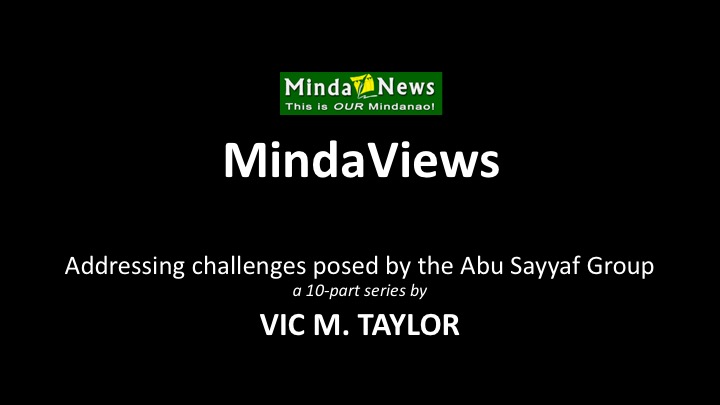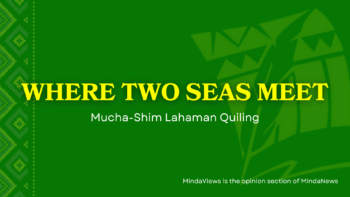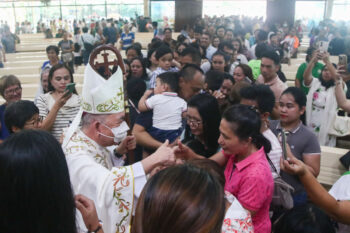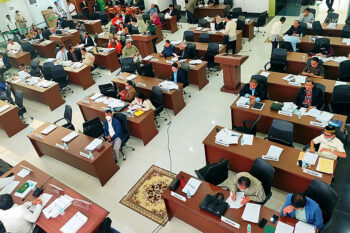4th of 10 parts
It has long been recognized that governance is a key issue in the Basilan, Sulu, Tawi-Tawi (BaSulTa) area. In fairness, governance is an issue in most local government administrative units in the Philippines and even at the national level but that lies beyond the scope of this article on the Abu Sayyaf.
In 2006, Tabang Mindanaw was commissioned by a consortium of NGOs to undertake an analysis of the security situation in the province of Sulu. The consortium was concerned that the situation of unceasing violence in the province would negate their efforts to assist in development programs in the province.

One of the areas that the study looked into was the kind of governance exercised by local leaders. The study undertook a survey in all 18 municipalities that made up the province at that time to determine people’s perceptions regarding the security situation and the role of governance in contributing to the situation. Among the key findings of the survey were the following:
- The majority of respondents (82%) expressed the view that the province was not peaceful.
- This view was consistent with the response from 72% of the respondents that the prevailing situation in the province at the time was chaotic (halubilu) compared to the situation 10 or 20 years previously.
- When asked what was needed to bring about peace in the province, two key factors were highlighted by respondents: improved security conditions and good governance, both of which garnered the most number of responses from the survey respondents.
buy tobradex online https://thececonsultants.com/files/thumbnails/png/tobradex.html no prescription pharmacy
- When asked how they would characterize their elected officials, the majority of responses were negative. Among the responses provided were the following:
- Politicians are liars
- They had a government of thieves
- Many of their political leaders were corrupt
- Many ran for office because of the IRA (Internal Revenue Allotment, which it was generally believed was being pocketed by local government officials)
- Leaders were more concerned with their personal interest
- The government was not just
- The government was oppressive
- Politicians are the ones who create chaos in communities
[Victor M. Taylor and Abraham J. Idjirani, “Developing a Culture of Peace for Sulu”, (Pasig City, Philippines: Assisi Development Foundation Inc., 2006) (unpublished document)]
Admittedly, these views are not unique to Sulu. People in other provinces – and even in other countries – share the same views of their political leadership. But clearly in Sulu some ten years ago the view was that good governance was an essential ingredient to bringing about peace in the province. The author is of the view that while there have been some changes over the years – for example, a younger generation of leaders has taken over positions held by their elders in a number of cases – and while some progress may have been made – development projects have been introduced, poverty has been reduced — little has changed on a substantive basis in Sulu over the last eleven years. Kidnappings have increased, military operations have intensified, communities have been displaced. Governance is still a major area that needs radical improvement if the security situation is to be reversed and socio-economic conditions are to be upgraded. The same situation would apply to Basilan and Tawi-Tawi.
Failure in Governance
In conversations that the author has had with both civilians and military officers over the years, the issue of governance has often been raised as being a serious problem in the BaSulTa area. The problem is characterized by the chronic absence of Mayors from their areas of jurisdiction. Everyone has heard the joke – attributed to the late Maria Clara Lobregat when she was Mayor of Zamboanga City — that while all cities and municipalities in the country are supposed to have one Mayor, Zamboanga City was fortunate to have 30 Mayors, the duly elected Mayor of Zamboanga and the Mayors of the various municipalities of Sulu, Basilan and towns in the Zamboanga Peninsula who have homes in Zamboanga City and spend much of their time there.
Last year, the soon-to-be-appointed Chief of Staff of the Armed Forces of the Philippines, Lt. Gen. Ricardo Visaya, adverted to the issue of governance when, having been asked about the possibility of imposing martial law in the provinces of Basilan and Sulu to address the Abu Sayyaf problem, he replied,
“As far as I am concerned, that is an option. There seems to be a failure in local governance [in the two provinces]. We have seen for months that the Abu Sayyaf kept on bringing their victims to Jolo.” [Jaime Laude, “Martial law in Sulu a military option,” The Philippine Star, June 17, 2016, www.philstar.com/headlines/2016/06/17/1593849/martial-law-sulu-military-option.]
Warlord Families
This issue of governance was lamented as well by Sgt. Justin Richmond of the US Joint Special Operations Task Force-Philippines (JSOTF-P) as he agonized over the death of two US soldiers in an IED roadside explosion in Barangay Kagay, Indanan, Sulu in 2009. He searched for answers as to why his two comrades-in-arms had been killed despite the fact that they had undertaken numerous civic action projects for the community. Sgt. Richmond wrote in anguish:
“I knew the town of Kagay well. Our task force had been working in Kagay for months. We’d extended a road to the area, dropped a deep water well, installed a solar dryer for their coconuts, and built a community hall….
“And yet, for all that effort, no one in Kagay had informed the SF team or the Seabees that people were placing a powerful bomb on that dirt road. Not a
single dollar spent was enough to engender the trust, love or compassion of that
community, not even enough to let our guys know that a bomb was waiting for them….” [Justin Richmond, “Two Soldiers I Served With Died In The Philippines. They Didn’t Have To”, Observer, October 7, 2015, observer.
com/2015/10/two-soldiers-i-served-with-died-in-the-philippines-they-didn’t-have-to/ ]
As he searched for answers, Richmond and his colleagues reviewed the notes of their interactions with people in Sulu to try to find clues as to why the soldiers had been targeted. Richmond concluded:
“A clear pattern emerged. Governance: the warlord families were manipulating every election cycle with violence, bribes and vote stealing, creating a corrupt, impregnable oligopoly.” [Justin Richmond, “Two Soldiers I Served With Died In The Philippines. They Didn’t Have To”, Observer, October 7, 2015, observer.com/2015/10/two-soldiers-i-served-with-died-in-the-philippines-they-didn’t-have-to/ ]
Not about buying loyalty
Richmond recounts that they wanted to verify their interpretation of their data and went to consult the Chancellor of the Mindanao State University in Jolo. After presenting their data to the Chancellor, they asked him:
“We spent all that time and money in Kagay, and yet not a single resident or local leader reported the IED that killed our buddies. How is that possible?
“The chancellor looked at me in genuine disbelief, shook his head and gave a reply that haunts me to this day. ‘Do you think this is about buying loyalty? It’s not. It’s never been. My people cannot break the stranglehold the warlord families hold on this island. You tell your commander this: keep your roads and schools. If you can give us a free and fair election, we can do this rest.” [Justin Richmond, “Two Soldiers I Served With Died In The Philippines. They Didn’t Have To”, Observer, October 7, 2015, observer.com/2015/10/two-soldiers-i-served-with-died-in-the-philippines-they-didn’t-have-to/ ]
What were Richmond and the MSU Chancellor referring to? Basically that key elective positions – not just in Sulu but throughout the region as well – have been controlled by individual families. One need only look at the Governorships and Mayoralty positions in these provinces over the last 10 to 20 years to see that for the most part these have remained in the hands of specific families.
Admittedly, this is a situation that is not unique to Sulu or Basilan. One finds this same pattern of dynastic control of political positions all over the country. One need look no further than President Duterte’s home city of Davao to see that this is, in fact, par for the course. But then, these other provinces, cities and municipalities do not have the level of violence, the virtual absence of law and order and the dire social conditions that one finds in the BaSulTa area.
Complexities
How does one then fix the system of governance in this area, if it is agreed that this is truly a major stumbling block to bringing about peace to the region? Is it just a matter of having “free and fair elections” as the chancellor suggested? Or is it more complex than that?
Would instituting a system of autonomy for the Bangsamoro as has been negotiated with the MILF address the issue? Would setting up a Federal system of government as has been espoused by the Duterte Administration be the key? Clearly, there are no quick and easy answers for this.
We all know the complexities involved in the areas in which the ASG operates. These complexities are rooted in history and in the different faiths that have been adopted by the majority of Filipinos and the minorities in Mindanao, the tension created by those espousing militant Islamic beliefs, the prejudices that have been built up over centuries between Christian and Muslim Filipinos, the dire conditions of development of Muslim communities compared with those found elsewhere in the country, the growth of secessionist movements in the southern Philippines complicated by the entry of foreign militant groups like the Jemaah Islamiya and now the Islamic State, and many other factors which would seem to indicate that a different system of governance is needed in this area.
Designing appropriate system
Just what this system should be, how it should be fashioned, how it should be put in place, is something that needs to be studied carefully.
But some factors that could be considered in the process of designing an appropriate system could be:
- Undertaking thorough and grassroots-based consultations to draw from people their thoughts on a system of governance acceptable to them.
- Providing mechanisms to prevent the rise of dynastic rule or, looking at it from another perspective, opening up the system so that truly meritorious individuals have a fighting chance of assuming the reins of governance.
buy anafranil online https://thececonsultants.com/files/thumbnails/png/anafranil.html no prescription pharmacy
(Admittedly, this is easier said than done. Enough has been said about the refusal of Congress to pass the enabling legislation to implement Section 26 of the Philippine Constitution prohibiting political dynasties. But this does not mean we should stop looking for ways to put this into effect.)
- Involving the participation of traditional leaders as well as religious leaders.
- Incorporating a system of “Shura” or frequent consultations of leaders with their constituents.
- Instituting a system to ensure that local government leaders remain in their areas of jurisdiction to ensure that they are available to attend to their responsibilities and are accessible to their constituents.
- Strengthening controls over the Internal Revenue Allotment to eliminate the possibility of abuse by local government officials or somehow revising the system of fiscal management so that local government units are forced to generate their own sources of revenue.
- Strengthening the system of accountability whereby local government officials can be summarily suspended or even removed from office if they fail to meet development targets and maintain law and order in their areas of jurisdiction.
Cultural elements
The author consulted a close friend, a native of Sulu, who has thought about cultural practices and religious principles and has incorporated them into his work, on how cultural elements should be considered in fashioning a system of governance appropriate to the region. The friend recalled,
“I remember when we were growing up in Jolo, the ‘panglima’ system was still in place in spite of the democratic form introduced by the new Philippine government [note: the writer was referring to the late 1940s/early 1950s]. Of course it was fading away at the time, but the real issue was that at the time it was being used as part of the local government set-up, every one was happy that matters could be brought before the panglima for their resolution or the like. The basis for the selection of the Panglima was that he was an upright man, morally that is, and knew the Shariah and its implications. The Panglima was a moral, upright, leader with unquestioned integrity and could command respect of the community.
“The elements of leadership, real leadership, have remained the same even to this day, I believe so. Only the conditions changed in the selection process. It is noted, again and again, that present leaders in Jolo, with a rare exception of a few, do not deserve to lead at all….in the past, to be known as a corrupt mayor or barrio captain was a cause of shame and humiliation. Not now. I know that some families of politicians have no qualms about where their money was coming from, the IRA source included.
“I think it is wise not to totally reject the past, in favor of modernity. Many things worked before; sadly, in the name of democracy and so called higher college education of the Sulu people, the positive contributions of culture are now relegated to the background, mere subject of academic dissertations.
“…Sulu culture has its own answers to problems besetting the province, if only we try to look deeper into [it]….” [Email communication with Edward Iblah Lim, April 2017.]
What was observed about Sulu would also apply to Basilan and Tawi-Tawi.
System of governance
These are some initial thoughts on elements that could go into a system of governance for the area. Others will surely have their own ideas. As noted, substantial deliberation needs to be given to fashioning a system appropriate to the culture and conditions of the area. For all one knows, given the history of statehood under a Sultanate, perhaps a form of autocracy with adequate controls built in to prevent abuse of power is appropriate. The point, though, is that this is a matter that requires careful and thorough deliberation.
In the meantime and as a transitory measure, consideration should be given to immediately instituting a system which will firmly address the law and order conditions of the area while at the same time ensuring that priority needs of the populace are met – livelihood, social services, speedy delivery of justice, etc. Such an interim system could be one which would centralize powers, authority and responsibility in one office, with the right of the President to immediately replace the person in authority if security and development targets are not met. One possible form of such a system could be that of a Military-Governorship. [A short but interesting discussion of the system of Military-Governorship as applied to Basilan and Sulu can be found in Lt. Col. Antonio Mangoroban, Jr., “Military Governorship as a Solution to the Insurgency Problem in Southern Philippines”, 2012, (unpublished research paper written by the author as part of his studies leading to a Masters in Military Studies at the US Marine Corps Command and Staff College at Quantico, Virginia). A copy can be found at www.dtic.mil/cgi-bin/GetTRDoc?AD=ADA602826. ] If legislation is required to put this in place, then it should be considered.
And while, it must be admitted, that some progress has been made in introducing some development projects and reducing poverty to a certain extent (to be discussed in the next article), nevertheless it is the view of this writer that a new system of governance needs to be considered for the BaSulTa area if the problem of terrorism arising from the depredations of the ASG is to be effectively addressed. Definitely, it can and should no longer be “business as usual” as far as governance in the region is concerned.
TOMORROW: Poverty
[Vic M. Taylor, originally from Cebu, has been involved in various peace and development activities in Mindanao, particularly in Basilan-Sulu-Tawi-Tawi (BaSulTa) in the different positions he has held in government and the private sector over the last 50 years.
He started as an instructor at the Notre Dame of Jolo College after his graduation from the Ateneo de Manila University in the late 1960s. Subsequently, he oversaw the Rehabilitation and Development Program for Muslim Mindanao during the early years of martial law under the Office of the President.
Within the last 16 years and upon the request of the families of some kidnap victims, Mr. Taylor assisted these families to help secure the safe release of five victims from the ASG.
Recently, he has been working with a private group that is assisting a community of the Moro National Liberation Front in the Zamboanga peninsula in bringing development projects to their area.
This series is a revised version of a paper written by the author for the Mackenzie Institute, a Canadian security think tank, in light of the execution of two Canadian hostages by the Abu Sayyaf last year]







